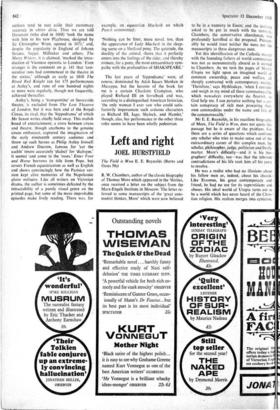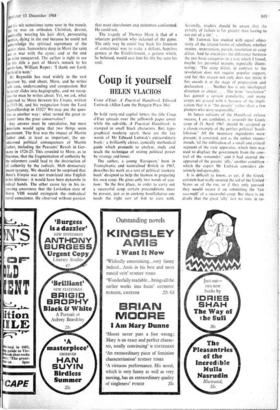Left and right
JOEL HURSTFIELD
The Field is Won-E. E. Reynolds (Burns and Oates 5Qs) R. W. Chambers, author of the classic biography of Thomas More which appeared in the 'thirties, once received a letter on the subject from the Marx-Engels Institute in Moscow. The letter re- ferred to some manuscripts of the 'great com- munist thinker, More' which were now believed
to be in a nunnery in Essex; and the institute asked to be put in touch with the nunnery. Chambers; the conservative churchman, was profoundly horrified at the proposal. Presum- ably he would trust neither the nuns nor the manuscripts to these dangerous men.
Yet this identification of the Catholic martyr with the founding fathers of world communism was not as monumentally absurd as it seemed to Chambers. As we turn the pages of Mores Utopia we light upon an imagined world of common ownership, peace and -welfare, all sharply contrasted with contemporary society. 'Therefore,' says Hythlodaye, 'when I consider and weigh in my mind all these commonwealths which nowadays everywhere do .flourish, so God help me, I can perceive nothing but a cer- tain conspiracy of rich men procuring their own commodities under the name and title of the commonwealth.'
Mr E. E. Reynolds, in his excellent biography , of More, The Field is Won, does not quote this passage but he is aware of the problem. For there are a series of-questions which confront any scholar who tries to make sense out of the extraordinary career of this complex man, the scholar, philosopher, judge, politician-and finally martyr. More's difficulty—and it is his hie-- graphers' difficulty, too—was that the inherent contradictions of his life took him all his years to resolve.
He was a realist who had no illusions about his fellow men or, indeed, about his church. Like Erasmus, his great contemporary and friend, he had no use for- its superstitions and abuses. His ideal world of Utopia turns out to:i be a world which has never heard of the Chris-41 tian religion. His realism merges into cynicism; arai his wit sometimes turns sour in the mouth. fet he was an orthodox Christian, devout, ascetically wearing his hair shirt, persecuting heretics, dying in the end because he could not acknowledge the spiritual supremacy of the ular state. Somewhere deep in More the saint /as at war with the cynic; and at the end me saint conquered. The author is right to use for his title a part of More's remark to his aan-in-law, William Roper: 'I thank our Lord, the field is won.'
Mr Reynolds has read widely in the vast literature by, and about, More, and he writes sith ease, understanding and compassion. But
at never slides into hagiography, and we recog- Rise the man he writes about. Yet, we ask, what
happened to More between his Utopia, written m 1515-16, and his resignation from the Lord Chancellorship in 1532? We may put the ques- tMn in another way: what turned the great re- former into the great conservative?
Any answer must be speculative, but most historians would agree that two things seem paramount. The first was the impact of Martin Luther and, at least as important, the un- rehearsed political consequences of Martin Luther, including the Peasants' Revolt in Ger- many in 1524-25. This revealed to More, as to Erasmus, that the fragmentation of authority -by . the reformers could lead to the destruction of •
all authority by the radicals. Mob democracy meant tyranny. We should not be surprised that More's Utopia was not translated into English
in•his lifetime: it would have been dynamite in radical hands. The other cause lay - in his .in- creasing awareness that the Leviathan state of Henry VIII would extinguish 'the. individual moral conscience. He observed without. passion that most churchmen and statesmen conformed. He could not.
The tragedy of Thomas More is that of a reluctant politician who sickened of the game. The only wax he could buy back his freedom of conscience was to make a defiant, hopeless gesture at the Establishment, a gesture which, he believed, would cost him his life but save his soul.















































 Previous page
Previous page